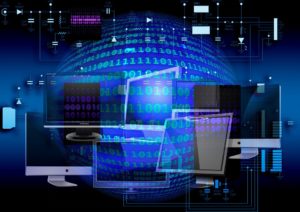
Overview
Are you afraid of what AI can do or are you looking forward to the benefits it can provide? Part of your decision would be based on whether you feel that the glass is half full or half empty, but the reality is that there are always consequences to technological advancements. Hopefully, we can honestly say a lot of it will be for the good of humankind, but let’s not be naive and think three won’t be those nefarious individuals looking to selfishly benefit at the expense of the rest of us.
One example would be the development of the atom bomb, which was the result of Einstein’s theory of relativity, even though the scientist had no idea of the frightening consequences his theory would bring.
Enter AI
Artificial intelligence (AI) is a rapidly growing field that has the potential to transform our world in countless ways. From healthcare to finance, education and transportation, AI can benefit us in a myriad of ways, but not everyone is on board with this as we will see in this article.
Regardless, artificial intelligence is advancing at an exceptional rate whether we like it or not, as our AI avatars explain below.
So let’s take a look at both the positives and negatives of artificial intelligence and what it can potentially have for us and then you can decide.
The Benefits
Advancement on Healthcare

One of the most significant benefits of AI is its potential to revolutionize healthcare. AI can analyze vast amounts of medical data, including patient records, lab results and imaging studies.
With this information, its algorithms can detect patterns and make predictions that could help doctors diagnose and treat diseases more accurately and quickly than ever before. It can also help identify high-risk patients, allowing doctors to intervene early and prevent diseases from progressing.
Transportation

Artificial intelligence can be used to optimize traffic flow and reduce congestion and subsequently, travel time for busy commuters.
Moving not too far into the future are autonomous vehicles – cars that drive themselves. There are some being tested now, such as Teslar and Google and Teslar already has autonomous vehicles on the market, but a driver must remain inside.
When it does become mainstream, self-driving cars, buses and trains have the potential to significantly reduce accidents, traffic congestion, and pollution. By removing the human element from driving, these vehicles can make our roads safer and more efficient.
Education

Artificial intelligence can also be used to improve education. AI-powered tutoring systems can provide personalized, adaptive learning experiences for students of all ages and abilities.
By analyzing a student’s learning style, strengths and weaknesses, these systems can create customized lesson plans that help them learn more effectively. This can lead to improved academic outcomes and greater educational equity, as students who may struggle with traditional teaching methods can receive tailored instruction that meets their needs.
One caveat is the temptation for students to cheat by using apps such as Chat GPT, but alert teachers should be able to tell the difference by determining if the student’s writing style has changed. With that said, this will still be a challenge for educators.
Finance
Ai can be used to detect fraud, manage risk and optimize investments. By analyzing financial data, machine learning algorithms can detect patterns that may indicate fraudulent activity, alerting financial institutions to potential threats before they cause significant damage.
Additionally, it can help financial institutions manage risk more effectively by predicting market fluctuations and identifying potential investments that offer high returns with low risk.
Law Enforcement
AI-powered surveillance systems can detect potential threats in public spaces, alerting law enforcement and allowing them to respond more quickly.
It can also be used to analyze crime data, helping law enforcement identify patterns and allocate resources more effectively. Indeed, New York City Mayor Eric Adams introduced crime-fighting robots to the Times Square area and if they prove productive, they will be placed all over the city.
The Environment

By analyzing environmental data, AI can help us understand the impacts of human activity on the planet and develop strategies to mitigate them. For example, it can help us optimize energy consumption, reduce waste and improve recycling efforts. Additionally, AI can help us predict and respond to natural disasters, reducing their impact on human lives and property.
The Negatives
Of course, as with any powerful technology, AI also poses some risks and challenges. One concern is the potential for it to be used in ways that violate privacy or human rights.
Additionally, the use of AI in decision-making processes could result in biases or discrimination if the algorithms are not carefully designed and monitored. Finally, there is the risk that AI could become too powerful, leading to unintended consequences or even threatening human existence.
To mitigate these risks, we must approach AI development with caution and foresight. We must ensure that AI is developed and used in ways that prioritize human welfare and respect human rights. This requires ongoing dialogue and collaboration between technologists, policymakers and the public, as well as strict laws that prohibit collusion and/or intentionally skewing the algorithms.
Potential Dangers

Artificial Intelligence can pose significant dangers that need to be addressed. Similar to the potential dangers of the use of quantum computers, the same threats are associated with AI.
The Labor Question
No doubt, unemployment due to artificial intelligence is a major concern. As this technology advances, it becomes increasingly capable of performing tasks that were once done by humans, leading to job loss and economic disruption.
For example, self-driving cars have the potential to replace human drivers, which would lead to unemployment in the transportation sector. This could result in a significant reduction in the workforce and an increase in social inequality.
Discrimination
Another danger is its ability to perpetuate biases and discrimination. Algorithms are designed to learn from data, and if the data used is biased, the AI will also be biased. This can result in unfair decisions being made, such as in hiring, lending, or criminal justice. It can have significant negative impacts on individuals and communities.
The Military

AI could pose a significant threat to global security. With technological advancements increasing in this arena technology, it is becoming increasingly possible for computers to be used in cyber-attacks or even to control weapons systems. This could lead to significant risks and damages, such as loss of life or damage to critical infrastructure.
Malicious Financial Behavior

The financial markets would most likely be the most affected by artificial intelligence, both for good and bad. We have already discussed the good, but the bad is already a concern. There can be serious consequences that could affect the banks and stock market as nefarious individuals try to override the algorithms with corrupt data and computer instructions. The expression “What’s in your wallet” will have a much greater significance should malicious AI alter your bank accounts.
A Question of Morals
Finally, the development of AI could also pose ethical and moral dilemmas. As these algorithms become more intelligent, questions arise about their autonomy and decision-making capabilities. If an AI system makes a decision that is morally or ethically questionable, who is held accountable? What happens if an AI system is programmed to harm humans or perform unethical tasks?
AI in a Nutshell
Artificial intelligence can help us solve some of the biggest challenges facing our society. However, we must approach AI with caution and foresight, taking steps to mitigate risks and ensure that this technology is used in ways that prioritize humanity and respect human rights. With careful planning and collaboration, we can harness the power of Artificial Intelligence to create a better future for all!
